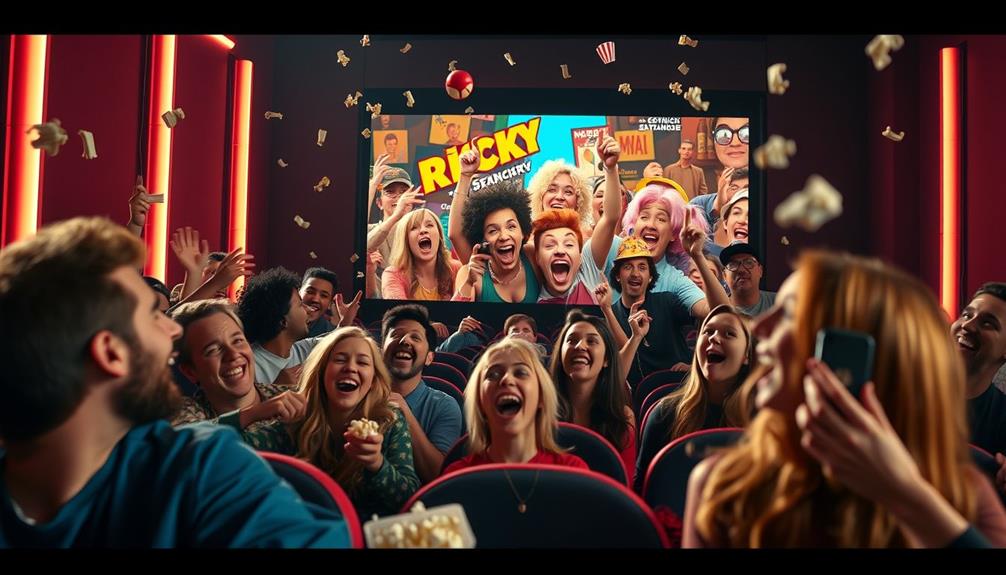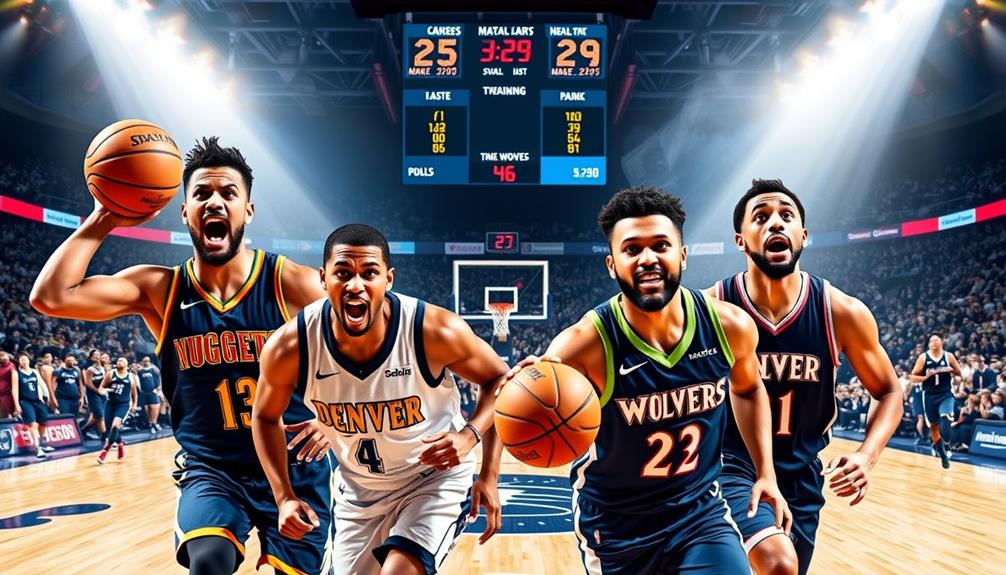Hannah Waddingham almost turned down the role of Rebecca Welton in "Ted Lasso" due to fears of being typecast and doubts about her comedic abilities. She was concerned about stepping away from her dramatic background and the challenges of portraying humor authentically. Despite these hesitations, the prospect of collaborating with a talented cast ultimately swayed her decision. As Rebecca evolves, Waddingham brings depth to the character, balancing vulnerability and humor in a way that resonates deeply with audiences. Curious about how this journey transformed not just her character but also the show? You might want to explore more about it!
Key Takeaways
- Hannah Waddingham hesitated to accept the role of Rebecca due to fears of being typecast as a villain.
- Her background in drama raised concerns about her ability to deliver humor authentically.
- Waddingham was intimidated by the comedic shift and unsure if audiences would connect with Rebecca's complexity.
- The decision to take the role was influenced by the opportunity to work with a talented ensemble cast.
- Emotional authenticity and collaboration with writers allowed for a rich and relatable character development.
Initial Hesitations About the Role
Hannah Waddingham faced a pivotal moment when considering the role of Rebecca on "Ted Lasso." She hesitated, worried that portraying her character as a "villain" might pigeonhole her into similar roles in the future. This apprehension stemmed from her background in dramatic performances, which made her question her ability to deliver humor effectively.
You can imagine the inner conflict she experienced; stepping into a comedic role felt intimidating. The pressure to maintain authenticity, especially in a humorous context, can often be overwhelming for actors shifting between genres, similar to the challenges of reviving old friendships where one must navigate past perceptions.
Her concerns didn't stop there. Waddingham also doubted whether the character would resonate with audiences, especially given the complexity of Rebecca's persona. The fear of being typecast loomed large, creating a significant barrier to embracing the opportunity.
However, the allure of working alongside a talented ensemble cast and a creative team eventually swayed her decision. After deep reflection on Rebecca's depth and potential for growth, Waddingham chose to accept the role.
This decision turned out to be transformative, not just for the character but for Waddingham herself. By taking the plunge, she broke through her hesitations and opened herself up to new possibilities, ultimately redefining her career trajectory.
The Transformation of Rebecca

Throughout the series "Ted Lasso," Rebecca Welton transforms from a powerful yet vulnerable owner of AFC Richmond into a more empathetic and supportive leader. This journey of growth captivates viewers as they witness her evolving character, which challenges traditional roles in comedy.
Rebecca's backstory reveals her struggles with personal relationships and self-acceptance, showcasing her emotional depth. Hannah Waddingham's portrayal adds elements of humor and vulnerability, particularly through her relationship with food, symbolizing her emotional eating and personal challenges.
The collaboration with writers enables an organic development of Rebecca's character, making her transformation feel relatable. By shifting from an antagonistic role to one embodying kindness, she resonates deeply with audiences, showcasing true empathy.
Here's a brief overview of Rebecca's transformation:
| Stage | Characteristics | Impact on Others |
|---|---|---|
| Initial Antagonist | Powerful, vulnerable, self-centered | Creates tension and conflict |
| Growing Empathy | More supportive, open to change | Builds trust with teammates |
| Embracing Kindness | Kind, nurturing, leader | Inspires growth in others |
Rebecca's journey is a reflection of the power of transformation and the importance of empathy in leadership.
Emotional Impact of the Emmy Win

Winning an Emmy can be a life-altering moment for any actor, and for Hannah Waddingham, it brought an overwhelming mix of shock and disbelief. In a world where emotions run high, her heartfelt reaction mirrored that of other artists, like the mystery actor's poignant performance in a recent Coca-Cola ad.
You can imagine the emotional impact of hearing her name announced, and the sheer weight of that moment must've been incredible. Surrounded by her supportive co-stars, she described the experience as both beautiful and embarrassing, reflecting just how profound it was for her.
In the three weeks following her win, Waddingham and her castmates chose to extend their stay at the event location. Instead of rushing to celebrate, they opted for a quiet moment at the beach, allowing themselves to process the victory.
This decision highlights one thing: the importance of taking time to reflect on significant achievements.
Later, they celebrated with a special dinner, reinforcing the camaraderie that has been central to their experience. Waddingham's win not only acknowledged her individual talent but also underscored the show's cultural significance.
It resonated with audiences seeking positivity and authenticity, amplifying the emotional weight of this moment in her career.
Connection Between Hannah and Rebecca

The bond between Hannah Waddingham and her character Rebecca is both profound and personal, creating a rich tapestry of authenticity in her performance. Hannah relates to Rebecca as a complex leader who embodies power and vulnerability, reflecting her own life experiences. This connection enables her to portray Rebecca with genuine emotion and depth. The challenge of managing stress and maintaining a healthy lifestyle, similar to menopause management, resonates with Hannah, adding another layer to her understanding of Rebecca's character.
- Hannah describes her relationship with Rebecca as an old friendship.
- The development of Rebecca's character involved collaboration with writers.
- The fluidity between Hannah's identity and Rebecca's traits enhances character spontaneity.
- Rebecca's storyline as an emotional eater adds layers of vulnerability.
Through these connections, Hannah taps into the essence of Rebecca, making her struggles and triumphs resonate on screen. The authenticity of her performance shines through, as she draws from personal insights, creating a character that feels real to viewers.
The emotional layers woven into Rebecca's story highlight the complexity of her character, making it relatable. Hannah's ability to connect so deeply with Rebecca not only enriches her portrayal but also contributes to the overall storytelling, ensuring that audiences feel every moment of Rebecca's journey.
Collaborative Creative Process

When you think about the collaborative creative process behind Hannah Waddingham's character, Rebecca, it's clear that emotional connection played a key role.
The spontaneity in how her character developed, fueled by the ensemble's strong dynamics, brought authenticity to the screen. This teamwork not only shaped Rebecca's backstory but also enriched the entire production experience.
The increasing popularity of plant-based diets reflects a broader cultural shift towards sustainability, paralleling the way the cast and crew embraced their creative roles with a focus on shared values.
Emotional Character Connection
Connecting emotionally with a character can transform a performance, and for Hannah Waddingham, her role as Rebecca is a demonstration of that connection. Waddingham's profound personal connection to Rebecca creates layers of emotional authenticity that resonate with audiences. She describes her relationship with the character as an old friendship, reflecting her own experiences and emotions, which enhances the depth of her portrayal.
This deep connection mirrors the collaborative artistic expression seen in other creative partnerships, such as Avi Kaplan's recent projects.
The character development process for Rebecca involved close collaboration with writers, allowing for organic insights into her backstory and family dynamics. This collaboration fostered unique moments that made Rebecca relatable and memorable.
- Waddingham embraces fluidity between her personal identity and Rebecca's traits.
- Ad-libbing enhances the emotional authenticity of her performance.
- Humorous moments, like the eulogy, showcase strong writing intertwined with Waddingham's insights.
- The combination of personal connection and collaboration contributes to the overall impact of the show.
This approach not only enriches Waddingham's performance but also helps to craft a character that feels real and multidimensional, making her portrayal of Rebecca truly unforgettable.
Spontaneity in Development
Hannah Waddingham's commitment to spontaneity greatly shapes the collaborative creative process behind her portrayal of Rebecca. By embracing spontaneity, she allows character development to unfold organically, creating a more authentic representation of Rebecca's complexities. This approach not only enriches the character's backstory but also investigates her family dynamics, making Rebecca relatable and multi-dimensional.
The process of developing characters can be likened to the way certain zodiac signs are perceived as more appealing socially, as both rely on natural qualities that resonate with audiences certain signs enhance allure.
Waddingham thrives on the creative freedom that comes from collaborating with writers. This collaboration fosters a deeper understanding of Rebecca, resulting in moments that resonate emotionally with the audience. Ad-libbing plays a vital role in enhancing emotional authenticity, giving Waddingham the opportunity to express genuine emotions that reflect the character's experiences.
You'll notice how these spontaneous moments contribute to an engaging storytelling experience, making Rebecca feel like an old friend to Waddingham. This connection blurs the lines between her personal identity and the character, allowing her to explore Rebecca's traits in a fluid manner.
Ultimately, spontaneity in development doesn't just enhance Waddingham's performance; it transforms Rebecca into a character that audiences can truly connect with, creating a lasting impact.
Ensemble Collaboration Dynamics
The vibrant ensemble collaboration on "Ted Lasso" creates a dynamic creative process that elevates both performances and storytelling. You'll notice the strong camaraderie among cast members, which fosters a collaborative atmosphere that enhances creativity.
This environment encourages actors to remain engaged during all coverage, ensuring their interactions contribute to a cohesive narrative. Additionally, the benefits of curiosity within the cast can lead to innovative character portrayals and enriched storytelling.
Key writers provide real-time feedback during filming, allowing you to adjust your performance and maintain high energy levels. This fluid exchange of ideas between actors and writers leads to organic character development, deepening the storytelling.
Here are some key elements of this collaborative process:
- Camaraderie: Strong relationships among cast members lead to trust and openness.
- Engagement: Actors are actively involved, enriching the narrative with their contributions.
- Real-time Feedback: Writers provide instant insights, enhancing performance quality.
- Fluid Idea Exchange: Collaboration fosters creativity, allowing for organic character arcs.
In this supportive atmosphere, the ensemble cast elevates the main characters, creating a unique dynamic that mirrors the show's success.
This collaboration is a demonstration of how teamwork can transform a creative project.
Audience Reception and Cultural Impact

As you watch "Ted Lasso," you can't help but feel a strong connection to the characters and their journeys.
The show's commitment to positivity and relatable storytelling has sparked a cultural shift, encouraging viewers to embrace kindness in their own lives.
Waddingham's portrayal of Rebecca contributes greatly to this impact, making audiences reflect on vulnerability and emotional strength.
This resonates with the ongoing conversations about resilience in challenging times, similar to the inspiring stories shared about Tim Chapman's Wife, who exemplifies unwavering strength amid adversity.
Audience Connection and Engagement
In "Ted Lasso," audiences find a revitalizing departure from the usual cynicism of modern comedies, embracing a narrative filled with positivity and genuine human connection. The show's uplifting themes resonate deeply, particularly during challenging times, offering viewers a sense of hope and joy.
This emotional resonance is further amplified by the exploration of astrological compatibility and its effects on attraction, as characters navigate their relationships with depth and authenticity.
Hannah Waddingham's character, Rebecca, showcases remarkable emotional depth, making her struggles relatable. Her journey, including her vulnerabilities as an emotional eater, creates a strong audience connection. The recurring motif of biscuits symbolizes her struggles, adding warmth and humor to her character's portrayal.
Key elements contributing to audience engagement include:
- Authentic portrayals: The ensemble cast's genuine camaraderie shines through, enhancing emotional investment.
- Relatable characters: Viewers connect with the characters' real-life struggles and triumphs.
- Positivity: The show counters cynicism, offering an invigorating perspective on life.
- Personal stories: Fans share how the series has inspired them, particularly during the isolation of the pandemic.
Together, these aspects foster a rich landscape for connection, ensuring that "Ted Lasso" resonates with audiences on multiple levels.
Positive Cultural Shifts
With a revitalizing blend of humor and heart, "Ted Lasso" has sparked significant cultural shifts, inviting audiences to embrace kindness and positivity. This show stands out in an era often dominated by cynicism, resonating deeply with viewers who crave emotional support, especially during challenging times like the pandemic. The character of Rebecca, portrayed by Hannah Waddingham, adds layers of relatability, showcasing vulnerabilities such as her emotional eating.
The use of symbolic elements, like biscuits, not only enhances humor but also fosters connections with the audience. These relatable moments become viral sensations, encouraging discussions about mental health and personal struggles.
Here's a closer look at the show's positive impact:
| Aspect | Description |
|---|---|
| Uplifting Themes | Contrasts cynicism, promoting positivity |
| Audience Connection | Personal stories of hope and joy |
| Character Depth | Relatable characters and emotional storylines |
The ensemble cast's genuine chemistry enriches the narrative, creating a collaborative environment that makes "Ted Lasso" culturally relevant. Ultimately, it's this blend of humor, emotional depth, and positivity that has transformed audience reception and cultural impact.
Impactful Storytelling Techniques
The impact of "Ted Lasso" goes beyond its humorous surface, showcasing storytelling techniques that resonate deeply with audiences. You'll find that the show not only entertains but also inspires, emphasizing kindness and support in a world often filled with cynicism.
Its cultural relevance shines brightly, especially during challenging times like the COVID-19 pandemic, where many sought hope and joy. The series embodies a sense of collaboration and creativity similar to the principles of Design Thinking, as it encourages viewers to embrace empathy and connection.
Key storytelling techniques that enhance the series include:
- Character Complexity: Characters like Rebecca, played by Hannah Waddingham, offer relatable struggles, such as emotional eating, which adds depth to the narrative.
- Symbolism: The recurring theme of biscuits highlights vulnerability while enriching Rebecca's storyline, blending humor with emotional insight.
- Humor with Heart: The balance of comedic moments and heartfelt situations invites introspection, breaking traditional comedic norms.
- Audience Connection: The show fosters a loyal fanbase, with personal stories reflecting its impact on mental well-being.
Through these impactful storytelling techniques, "Ted Lasso" creates a narrative that not only entertains but also engages audiences on a deeper emotional level.
Lessons Learned From the Journey

Hannah Waddingham's journey in portraying Rebecca on "Ted Lasso" offers valuable lessons about trusting instincts and embracing spontaneity. Initially, she hesitated to accept the role, worried that its complexity wouldn't resonate with audiences. This experience underscores the importance of trusting your instincts in creative decisions.
As she developed her character, Waddingham learned to embrace spontaneity, fostering a deeper connection with Rebecca. This approach highlights the value of emotional authenticity in performance, allowing for genuine moments that resonate with viewers.
The collaborative process with the show's writers enriched her understanding of Rebecca's backstory, proving that teamwork leads to more nuanced storytelling. Engaging in ad-libbing often resulted in genuine emotional expression, reinforcing the need for authenticity in acting.
Moreover, Waddingham experienced the positive impact of camaraderie among the cast. A supportive environment not only fosters creativity but also encourages personal growth, which is essential in the entertainment industry.
Frequently Asked Questions
How Many Languages Does Hannah Waddingham Speak?
Hannah Waddingham speaks English as her primary language and is proficient in French. Her language skills enhance her versatility in acting, allowing you to appreciate her ability to take on diverse roles in various productions.
Conclusion
You'd never guess that Hannah Waddingham almost turned down the role of Rebecca, right? It's funny how life works out—if she hadn't taken that leap, we might've missed an incredible transformation and emotional journey. Her Emmy win not only celebrated her talent but also connected us all to Rebecca's character in unexpected ways. So next time you hesitate at a crossroads, remember Hannah's story; sometimes, the best decisions come from embracing the unknown.










